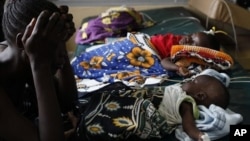The world's first experimental malaria vaccine produced disappointing results in a large-scale test among African infants, raising questions about its potential for fighting the disease.
The vaccine, promoted as a new weapon in the fight against malaria, reduced the risk of malaria by only 31 percent in infants aged six to 12 weeks. The study involved more than 6,500 babies.
The results, released Friday, showed the vaccine providing less than half the protection it did in a previous smaller trial involving infants. The report said the "modest protection" the vaccine provided in this latest trial was also lower than the 50 percent reported last year among older children.
Billionaire Microsoft founder and philanthropist Bill Gates, whose foundation is helping fund the vaccine, said the effectiveness rate came back lower than hoped.
But the top British drug manufacturer developing the vaccine, GlaxoSmithKline, will continue its efforts. Chief executive Andrew Witty said the drugmaker remains convinced that the RTS,S vaccine has a role to play in tackling malaria.
The World Health Organization estimates that more than 650,000 people die from the mosquito-borne illness each year. The vast majority are children in sub-Saharan Africa.





